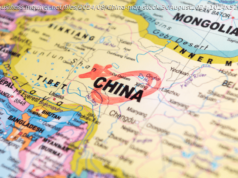The Chinese regime fueled further international outcry after its rubber-stamp legislature officially endorsed a national security law on May 28 aimed at quashing dissent…
The Chinese regime fueled further international outcry after its rubber-stamp legislature officially endorsed a national security law on May 28 aimed at quashing dissent in Hong Kong.
Proclaiming Hong Kong a “bastion of freedom,” the United States and its major allies—UK, Australia, and Canada—issued a joint statement reprimanding Beijing’s move, warning that the law could jeopardize the city’s status as an international hub known for its rule of law and civil liberties.
The countries said the proposal, which bypassed Hong Kong’s legislature to directly ban any acts of “secession, subversion, and terrorism activities,” “lies in direct conflict with its [China’s] international obligations” and risks exacerbating existing conflicts in the city, where protests recently reignited.
At a London press conference following the news from China, U. K. foreign secretary Dominic Raab urged the Chinese regime to “step back from the brink and live up to its responsibilities as a leading member of the international community.”
If “China continues down this path,” the U. K. will grant greater visa rights for Hong Kong citizens who hold a BNO (British national overseas) passport by revoking their six-month visit limit, paving the way for them to resettle in the country, Raab said.
As many as 300,000 Hongkongers born before the former British colony reverted to Chinese rule in 1997 have such passports, according to the U. K. government.
Meanwhile, U. S. officials vowed to punish Beijing for violating Hong Kong’s freedoms.
“The US must hold China to account. The CCP’s decision today will have consequences for generations to come,” Sen. Marsha Blackburn (R-Tenn.) tweeted, referring to the Chinese Communist Party, hours after Beijing passed the controversial law.






